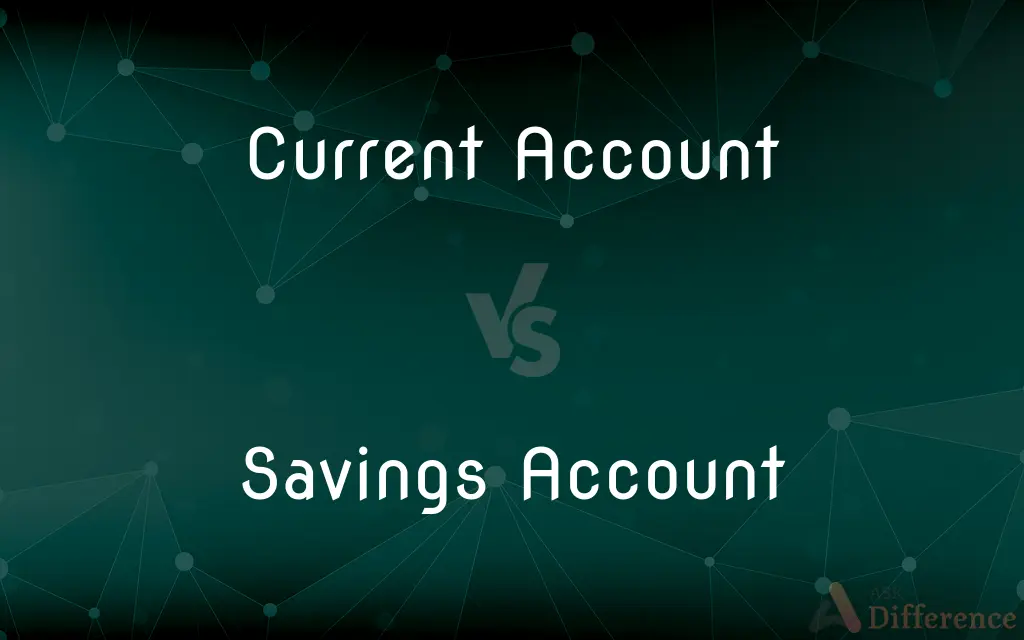Current Account vs. Savings Account — What's the Difference?
By Tayyaba Rehman — Published on October 26, 2023
Current Account is designed for regular transactions, often for businesses, while a Savings Account primarily helps individuals save money and earn interest.

Difference Between Current Account and Savings Account
Table of Contents
ADVERTISEMENT
Key Differences
A Current Account, often known as a checking account in the U.S., is primarily intended for daily transactions. It caters to frequent deposits and withdrawals, making it suitable for businesses or professionals. Conversely, a Savings Account is designed to encourage individuals to save money. It generally offers interest on the deposited amount, providing an incentive for account holders to save more.
The major benefit of a Current Account is its liquidity and ease of access. This means businesses or individuals can quickly move their money, ensuring smooth financial operations. On the other hand, a Savings Account is more about fostering a saving habit. Banks often provide an interest rate on these accounts, meaning the longer the money stays, the more it grows.
One notable distinction between a Current Account and a Savings Account is the provision of overdraft facilities. Many banks offer overdraft facilities with current accounts, allowing users to withdraw more money than they have in the account. Savings Accounts typically don't come with such a feature, emphasizing savings rather than spending.
Current Accounts usually don't offer as high an interest rate as Savings Accounts, if they offer interest at all. This is because they're optimized for transactional fluidity rather than for holding funds long-term. Savings Accounts, with their focus on preserving and growing funds, generally offer more attractive interest rates to account holders.
In essence, while both accounts cater to different financial needs, they are pivotal in the banking system. A Current Account emphasizes frequent transactions and flexibility, whereas a Savings Account promotes savings with accruing benefits.
ADVERTISEMENT
Comparison Chart
Primary Purpose
Frequent transactions
Saving money and earning interest
Typical Users
Businesses, professionals
Individuals
Interest Rates
Typically lower or none
Generally higher
Overdraft Facility
Often available
Rarely provided
Transaction Limits
Usually unlimited
Limited monthly transactions in some cases
Compare with Definitions
Current Account
Bank account emphasizing liquidity.
Businesses prefer the Current Account due to its flexibility in transactions.
Savings Account
Deposit account emphasizing monetary growth.
The appeal of the Savings Account lies in its dual role of safeguarding and growing funds.
Current Account
Deposit account without significant interest.
Though his Current Account doesn't earn much interest, its transactional ease is unparalleled.
Savings Account
Bank account offering interest on deposits.
His Savings Account accumulates a decent interest over the year.
Current Account
Financial account facilitating routine monetary operations.
After starting her cafe, she opened a Current Account for operational convenience.
Savings Account
Designed for depositing and accumulating money.
She opened a Savings Account to start her journey towards financial stability.
Current Account
An account for daily transactions.
She uses her Current Account to manage her freelance income.
Savings Account
Safe place to store money with growth potential.
She prefers to keep her emergency funds in a Savings Account for both safety and growth.
Current Account
Banking tool suitable for regular deposits and withdrawals.
Given the nature of his business, a Current Account was indispensable.
Savings Account
Financial tool promoting savings habits.
Many parents introduce their children to the concept of saving through a Savings Account.
Common Curiosities
How is a Current Account different from a Savings Account?
A Current Account is for regular transactions, while a Savings Account is to save money and earn interest.
Do all Current Accounts come with overdraft facilities?
Not all, but many Current Accounts offer overdraft facilities depending on the bank's policy.
Can I have both a Current Account and a Savings Account?
Yes, individuals can hold both types of accounts based on their financial needs.
Why don't Current Accounts offer high interest?
Current Accounts prioritize liquidity and frequent transactions over holding funds long-term.
Which account is better for earning interest?
A Savings Account typically offers higher interest rates compared to a Current Account.
Which account is ideal for managing monthly bills and expenses?
A Current Account, with its flexibility, is ideal for managing regular expenses.
Can I convert my Current Account into a Savings Account?
Banks have different policies, but generally, you'd need to open a new Savings Account.
Can a business have a Savings Account?
Yes, businesses can have Savings Accounts, but they often prefer Current Accounts for operational fluidity.
Do Savings Accounts always come with transaction limits?
Some Savings Accounts have transaction limits, but it varies by bank and account type.
Are funds in both accounts insured?
In the U.S., both account types are typically insured up to a limit by the FDIC in member banks.
Share Your Discovery

Previous Comparison
Imitation vs. Mimicry
Next Comparison
DisplayPort vs. HDMIAuthor Spotlight
Written by
Tayyaba RehmanTayyaba Rehman is a distinguished writer, currently serving as a primary contributor to askdifference.com. As a researcher in semantics and etymology, Tayyaba's passion for the complexity of languages and their distinctions has found a perfect home on the platform. Tayyaba delves into the intricacies of language, distinguishing between commonly confused words and phrases, thereby providing clarity for readers worldwide.
















































